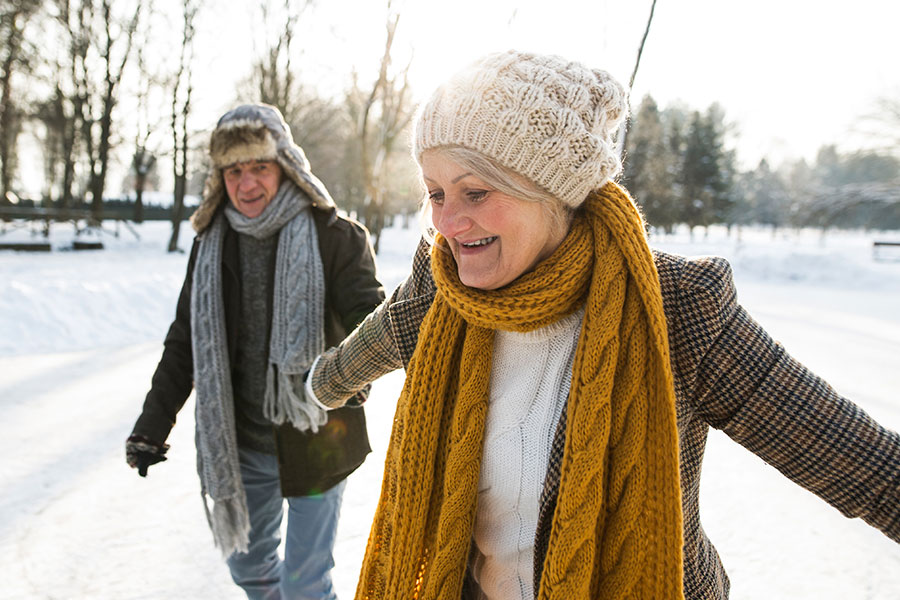 The winter season is almost in and it’s important for you to know how the cold weather affects your health, especially the heart.
The winter season is almost in and it’s important for you to know how the cold weather affects your health, especially the heart.
As per a 16-year old study conducted on over 280,000 heart patients, it was found that heart attacks are at peak during the winter season. This may be due to the change in the way how your body behaves or due to the cold weather.
The American Heart Association says that you can keep your heart safe if you keep it warm during winter, as cold weather steals the heat of your body. This also means that your body has to fight harder than usual in winter to maintain a warm enough core.
This is applicable to all elderly people who either have less body fat percentage or a reduced sense of temperature, or individuals with cardiovascular disease.
The following are the potential risk of winter followed by what all you can do to reduce their impact on your heart.
- Bad Sleep Schedule Keeps Your Body Tired
As you probably already know, your body needs a good night’s sleep after staying active for an entire day. When it comes to your heart, a minimum of 8 hours of sleep is good for your overall health, including your blood vessels and heart.
A low room temperature can be a cause to interrupt your sleep, which increases your risk of developing high blood pressure and heart disease in the long run.
According to the National Sleep Foundation (NSF), your room temperature should be somewhere between 60- and 70-degree Fahrenheit (~15 and 20 degree Celsius) during the winter season for optimum sleep. The NSF also recommends 7 to 9 hours of sleep for people between 18 and 64 years of age.
- Less or Almost No Workout
Stop thinking about the cold outdoor condition and do follow a regular exercise schedule religiously for your better health. Just because it’s cold outside doesn’t mean you have no outdoor activity to perform. Besides, it’s very important for you to keep moving in winter to keep your body active and warm.
Remember that fact that exercise helps your overall muscles (including heart) to become stronger and avoid vascular and coronary artery disease.
Health experts recommend keeping your body in an active state, especially during the winter season rather than just sitting still. You can simply pace around the room while talking on a phone call. When you go out shopping or office for that matter, try and park your car at a certain distance from the mall or the office premises.
- Excessive Mental Stress
All thanks to stress hormones like cortisol and adrenaline as well as cytokines – inflammatory proteins, excessive mental stress affects your heart and other blood vessels.
The release of these substances in your body leads to hardening of arteries, which further enhances the risk of stroke and a heart attack. So, you must take care of yourself and start avoiding excessive stress today.
In this way, the first step you need to take is to identify the stress elements and then take adequate steps to reduce them all. You can always call your friends, in case you feel alone. If you stay alone, you can always call your parents and talk to them whenever you miss them.
- High Risk of Flu
The Centers for Disease Control and Prevention (CDCP), flu virus and infections are very common during the winter season. As you probably already know, flu is highly contagious and often increases the risk of heart attack in winter.
In case you’re a heart patient or have had a stroke in the near past, you must take the seasonal vaccine in order to avoid the risk of a heart attack.
The CDCP recommends taking flu vaccine and at the same time, it emphasizes the importance of washing your hands with soap and water, especially you have been out in public for a long time.
Also, when in such places, try and avoid touching your eyes, nose, and mouth in order to prevent germs from spreading. If you’ve been attacked by the seasonal flu, make sure to cover your nose when you sneeze of wear a mask that sufficiently covers your nose for the safety of others.
- Avoid Excessive Alcohol Consumption
The season of winter brings festivity and joy. We all love to party and must to be well-aware of the risks of excessive alcohol consumption.
During the winter season, people consume excessive alcohol because it keeps them warm. However, they must avoid alcohol, especially when they’re out and exposed to cold air.
Everyone must be aware of the dangerous effects of alcohol on their body and therefore set a limit of alcohol consumption to themselves and stick to that. It’s better to dress up in layers, starting with a lightweight layer of an insulating base.
Being exposed to cold air directly relates to the loss of body heat, so don’t forget to cover your head with a hat or scarf. Also, cover both the hands with a nice warm pair of gloves during winter.
Bonus Tip
The winter season is the favorite season of almost every individual, especially the youngsters. Winter not only brings happiness and joy during the festive season but also invites seasonal flu and other health problems for elderly people in our family. In order to make sure they stay healthy during winter, you also need to ensure the safety of your own health.
Since alcohol consumption during winter is very common in our society, many people forget their limit. This not only turns them into a hot topic of gossip but also exposes them to health hazards. It’s important to set a limit to yourself and stick to that for the sake of your own good health.
Final Words!
While enjoying the festivities this winter season, don’t forget to take care of yourself and other dear ones. Don’t expose yourself to cold air and keep moving to stay healthy and fit this winter.







